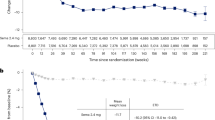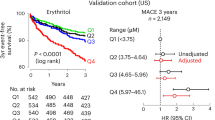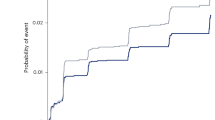Abstract
Malnutrition is reportedly associated with adverse clinical outcomes in various populations. However, associations between nutritional status and adverse outcomes in patients with hypertension have not been sufficiently elucidated. We therefore aimed to investigate the impact of nutritional status as evaluated by the Geriatric Nutritional Risk Index (GNRI) on adverse outcomes in patients with hypertension. We conducted a retrospective cohort study of 1588 hypertensive patients enrolled in the Fukushima Cohort Study. Participants were categorized into tertiles (T1–T3) according to GNRI at baseline. The primary endpoint of the present study was a kidney event, defined as a combination of a 50% decline in eGFR from baseline and end-stage kidney disease requiring kidney replacement therapy. Associations between GNRI and kidney events were assessed using Kaplan–Meier curves and multivariate Cox regression analyses. Median age was 64 years, 55% were men, median eGFR was 63.1 mL/min/1.73 m2, and median GNRI was 101.3. The lower GNRI group (T1) showed an increased incidence of kidney events in the Kaplan–Meier curve analysis. Compared to the highest GNRI group (T3), lower GNRI carried a higher risk of kidney events for both T2 (hazard ratio [HR] 1.38, 95% confidence interval [CI] 0.71–2.68) and T1 (HR 3.59, 95%CI 1.96–6.63). Similar relationships were observed for risks of all-cause death and cardiovascular events. Lower GNRI was associated with kidney events, all-cause death, and cardiovascular events in patients with hypertension. Nutritional status as evaluated by GNRI could offer a simple and useful predictor of adverse outcomes in this population.

This is a preview of subscription content, access via your institution
Access options
Subscribe to this journal
Receive 12 print issues and online access
$259.00 per year
only $21.58 per issue
Buy this article
- Purchase on Springer Link
- Instant access to full article PDF
Prices may be subject to local taxes which are calculated during checkout





Similar content being viewed by others
Data availability
The datasets generated and/or analyzed during the current study are available from the corresponding author on reasonable request.
References
Dikalova AE, Pandey A, Xiao L, Arslanbaeva L, Sidorova T, Lopez MG, et al. Mitochondrial deacetylase Sirt3 reduces vascular dysfunction and hypertension while sirt3 depletion in essential hypertension is linked to vascular inflammation and oxidative stress. Circ Res. 2020;126:439–52.
Cheng L, Rong J, Zhuo X, Gao K, Meng Z, Wen X, et al. Prognostic value of malnutrition using geriatric nutritional risk index in patients with coronary chronic total occlusion after percutaneous coronary intervention. Clin Nutr. 2021;40:4171–9.
Nakagawa N, Maruyama K, Hasebe N. Utility of geriatric nutritional risk index in patients with chronic kidney disease: a mini-review. Nutrients. 2021;13:3688.
Pressoir M, Desné S, Berchery D, Rossignol G, Poiree B, Meslier M, et al. Prevalence, risk factors and clinical implications of malnutrition in French comprehensive cancer centres. Br J Cancer. 2010;102:966–71.
Nelson JJ, Liao D, Sharrett AR, Folsom AR, Chambless LE, Shahar E, et al. Serum albumin level as a predictor of incident coronary heart disease: the Atherosclerosis Risk in Communities (ARIC) study. Am J Epidemiol. 2000;151:468–77.
Gümüşsoy M, Atmış V, Yalçın A, Bahşi R, Yiğit S, Arı S, et al. Malnutrition-sarcopenia syndrome and all-cause mortality in hospitalized older people. Clin Nutr. 2021;40:5475–81.
Djoumessi YF. The impact of malnutrition on infant mortality and life expectancy in Africa. Nutrition. 2022;103-104:111760.
Sze S, Pellicori P, Zhang J, Clark AL. Malnutrition, congestion and mortality in ambulatory patients with heart failure. Heart. 2019;105:297–306.
Bouillanne O, Morineau G, Dupont C, Coulombel I, Vincent JP, Nicolis I, et al. Geriatric Nutritional Risk Index: a new index for evaluating at-risk elderly medical patients. Am J Clin Nutr. 2005;82:777–83.
Yajima T, Yajima K, Takahashi H. Association of the erythropoiesis-stimulating agent resistance index and the geriatric nutritional risk index with cardiovascular mortality in maintenance hemodialysis patients. PLoS One. 2021;16:e0245625.
Matsukuma Y, Tanaka S, Taniguchi M, Nakano T, Masutani K, Hirakata H, et al. Association of geriatric nutritional risk index with infection-related mortality in patients undergoing hemodialysis: the Q-Cohort study. Clin Nutr. 2019;38:279–87.
Yamada S, Yamamoto S, Fukuma S, Nakano T, Tsuruya K, Inaba M. Geriatric Nutritional Risk Index (GNRI) and creatinine index equally predict the risk of mortality in hemodialysis patients: J-DOPPS. Sci Rep. 2020;10:5756.
Nishi I, Seo Y, Hamada-Harimura Y, Yamamoto M, Ishizu T, Sugano A, et al. Geriatric nutritional risk index predicts all-cause deaths in heart failure with preserved ejection fraction. ESC Heart Fail. 2019;6:396–405.
Kinugasa Y, Kato M, Sugihara S, Hirai M, Yamada K, Yanagihara K, et al. Geriatric nutritional risk index predicts functional dependency and mortality in patients with heart failure with preserved ejection fraction. Circ J. 2013;77:705–11.
Sargento L, Vicente Simões A, Rodrigues J, Longo S, Lousada N, Palma Dos Reis R. Geriatric nutritional risk index as a nutritional and survival risk assessment tool in stable outpatients with systolic heart failure. Nutr Metab Cardiovasc Dis. 2017;27:430–7.
Huo X, Wu M, Gao D, Zhou Y, Han X, Lai W, et al. Geriatric nutrition risk index in the prediction of all-cause and cardiovascular mortality in elderly hypertensive population: NHANES 1999-2016. Front Cardiovasc Med. 2023;10:1203130.
Cai X, Hu J, Wen W, Wang M, Zhu Q, Liu S, et al. Association between the geriatric nutritional risk index and the risk of stroke in elderly patients with hypertension: A longitudinal and cohort study. Front Nutr. 2022;9:1048206.
Kimura H, Tanaka K, Saito H, Iwasaki T, Oda A, Watanabe S, et al. Association of polypharmacy with kidney disease progression in adults with CKD. Clin J Am Soc Nephrol. 2021;16:1797–804.
Tanaka K, Saito H, Iwasaki T, Oda A, Watanabe S, Kanno M, et al. Association between serum potassium levels and adverse outcomes in chronic kidney disease: the Fukushima CKD cohort study. Clin Exp Nephrol. 2021;25:410–7.
Saito H, Tanaka K, Iwasaki T, Oda A, Watanabe S, Kanno M, et al. Xanthine oxidase inhibitors are associated with reduced risk of cardiovascular disease. Sci Rep. 2021;11:1380.
Nakajima A, Tanaka K, Saito H, Iwasaki T, Oda A, Kanno M, et al. Blood pressure control in chronic kidney disease according to underlying renal disease: the Fukushima CKD cohort. Clin Exp Nephrol. 2020;24:427–34.
Matsuo S, Imai E, Horio M, Yasuda Y, Tomita K, Nitta K, et al. Revised equations for estimated GFR from serum creatinine in Japan. Am J Kidney Dis. 2009;53:982–92.
Rossing P, Baeres FMM, Bakris G, Bosch-Traberg H, Gislum M, Gough SCL, et al. The rationale, design and baseline data of FLOW, a kidney outcomes trial with once-weekly semaglutide in people with type 2 diabetes and chronic kidney disease. Nephrol Dial Transpl. 2023;38:2041–51.
Impact of diabetes on the effects of sodium-glucose co-transporter-2 inhibitors on kidney outcomes: collaborative meta-analysis of large placebo-controlled trials. Lancet. 2022;400:1788–801.
Heerspink HJL, Stefánsson BV, Correa-Rotter R, Chertow GM, Greene T, Hou FF, et al. Dapagliflozin in patients with chronic kidney disease. N Engl J Med. 2020;383:1436–46.
Imai E, Matsuo S, Makino H, Watanabe T, Akizawa T, Nitta K, et al. Chronic Kidney Disease Japan Cohort (CKD-JAC) study: design and methods. Hypertens Res. 2008;31:1101–7.
Umemura S, Arima H, Arima S, Asayama K, Dohi Y, Hirooka Y, et al. The Japanese Society of Hypertension Guidelines for the Management of Hypertension (JSH 2019). Hypertens Res. 2019;42:1235–481.
Durrleman S, Simon R. Flexible regression models with cubic splines. Stat Med. 1989;8:551–61.
Marrie RA, Dawson NV, Garland A. Quantile regression and restricted cubic splines are useful for exploring relationships between continuous variables. J Clin Epidemiol. 2009;62:511–7.e511.
Orsini N, Li R, Wolk A, Khudyakov P, Spiegelman D. Meta-analysis for linear and nonlinear dose-response relations: examples, an evaluation of approximations, and software. Am J Epidemiol. 2012;175:66–73.
Huang W, Xiao Y, Wang H, Li K. Association of geriatric nutritional risk index with the risk of osteoporosis in the elderly population in the NHANES. Front Endocrinol. 2022;13:965487.
Lee M, Lim JS, Kim Y, Lee JH, Kim CH, Lee SH, et al. Association between geriatric nutritional risk index and post-stroke cognitive outcomes. Nutrients. 2021;13:1776.
Morgan DJ, Dhruva SS, Coon ER, Wright SM, Korenstein D. 2017 update on medical overuse: a systematic review. JAMA Intern Med. 2018;178:110–5.
Barker DJ, Gelow J, Thornburg K, Osmond C, Kajantie E, Eriksson JG. The early origins of chronic heart failure: impaired placental growth and initiation of insulin resistance in childhood. Eur J Heart Fail. 2010;12:819–25.
Hakim RM, Levin N. Malnutrition in hemodialysis patients. Am J Kidney Dis. 1993;21:125–37.
Kobayashi I, Ishimura E, Kato Y, Okuno S, Yamamoto T, Yamakawa T, et al. Geriatric Nutritional Risk Index, a simplified nutritional screening index, is a significant predictor of mortality in chronic dialysis patients. Nephrol Dial Transpl. 2010;25:3361–5.
Komatsu M, Okazaki M, Tsuchiya K, Kawaguchi H, Nitta K. Geriatric nutritional risk index is a simple predictor of mortality in chronic hemodialysis patients. Blood Purif. 2015;39:281–7.
Takahashi H, Ito Y, Ishii H, Aoyama T, Kamoi D, Kasuga H, et al. Geriatric nutritional risk index accurately predicts cardiovascular mortality in incident hemodialysis patients. J Cardiol. 2014;64:32–6.
Kuo IC, Huang JC, Wu PY, Chen SC, Chang JM, Chen HC. A low geriatric nutrition risk index is associated with progression to dialysis in patients with chronic kidney disease. Nutrients. 2017;9:1228.
Lin TY, Hung SC. Geriatric nutritional risk index is associated with unique health conditions and clinical outcomes in chronic kidney disease patients. Nutrients. 2019;11:2769.
Xiong J, Wang M, Wang J, Yang K, Shi Y, Zhang J, et al. Geriatric nutrition risk index is associated with renal progression, cardiovascular events and all-cause mortality in chronic kidney disease. J Nephrol. 2020;33:783–93.
Maruyama K, Nakagawa N, Saito E, Matsuki M, Takehara N, Akasaka K, et al. Malnutrition, renal dysfunction and left ventricular hypertrophy synergistically increase the long-term incidence of cardiovascular events. Hypertens Res. 2016;39:633–9.
Kiuchi A, Ohashi Y, Tai R, Aoki T, Mizuiri S, Ogura T, et al. Association between low dietary protein intake and geriatric nutrition risk index in patients with chronic kidney disease: a retrospective single-center cohort study. Nutrients. 2016;8:662.
Kubota K, Miyanaga S, Iwatani N, Higo K, Tokushige A, Ikeda Y, et al. Geriatric nutritional risk index is associated with prognosis in patients with pulmonary arterial hypertension and chronic thromboembolic pulmonary hypertension. Circ Rep. 2020;2:372–7.
Shiroma K, Tanabe H, Takiguchi Y, Yamaguchi M, Sato M, Saito H, et al. A nutritional assessment tool, GNRI, predicts sarcopenia and its components in type 2 diabetes mellitus: a Japanese cross-sectional study. Front Nutr. 2023;10:1087471.
Merker M, Felder M, Gueissaz L, Bolliger R, Tribolet P, Kägi-Braun N, et al. Association of baseline inflammation with effectiveness of nutritional support among patients with disease-related malnutrition: a secondary analysis of a randomized clinical trial. JAMA Netw Open. 2020;3:e200663.
Hunt KJ, Jaffa MA, Garrett SM, Luttrell DK, Lipson KE, Lopes-Virella MF, et al. Plasma connective tissue growth factor (CTGF/CCN2) levels predict myocardial infarction in the Veterans Affairs Diabetes Trial (VADT) cohort. Diabetes Care. 2018;41:840–6.
Maraj M, Kuśnierz-Cabala B, Dumnicka P, Gala-Błądzińska A, Gawlik K, Pawlica-Gosiewska D, et al. Malnutrition, inflammation, atherosclerosis syndrome (MIA) and diet recommendations among end-stage renal disease patients treated with maintenance hemodialysis. Nutrients. 2018;10:69.
Stenvinkel P, Heimbürger O, Paultre F, Diczfalusy U, Wang T, Berglund L, et al. Strong association between malnutrition, inflammation, and atherosclerosis in chronic renal failure. Kidney Int. 1999;55:1899–911.
Chen LK, Woo J, Assantachai P, Auyeung TW, Chou MY, Iijima K, et al. Asian working group for sarcopenia: 2019 consensus update on sarcopenia diagnosis and treatment. J Am Med Dir Assoc. 2020;21:300–7.e302.
Elder M, Moonen A, Crowther S, Aleksova J, Center J, Elder GJ. Chronic kidney disease-related sarcopenia as a prognostic indicator in elderly haemodialysis patients. BMC Nephrol. 2023;24:138.
Göbl C, Tura A. Focus on nutritional aspects of sarcopenia in diabetes: current evidence and remarks for future research. Nutrients. 2022;14:312.
Gärtner S, Kraft M, Krüger J, Vogt LJ, Fiene M, Mayerle J, et al. Geriatric nutritional risk index correlates with length of hospital stay and inflammatory markers in older inpatients. Clin Nutr. 2017;36:1048–53.
Hao X, Li D, Zhang N. Geriatric Nutritional Risk Index as a predictor for mortality: a meta-analysis of observational studies. Nutr Res. 2019;71:8–20.
Barbeito-Andrés J, Pezzuto P, Higa LM, Dias AA, Vasconcelos JM, Santos TMP, et al. Congenital Zika syndrome is associated with maternal protein malnutrition. Sci Adv. 2020;6:eaaw6284.
Soysal P, Veronese N, Arik F, Kalan U, Smith L, Isik AT. Mini Nutritional Assessment Scale-Short Form can be useful for frailty screening in older adults. Clin Int Aging. 2019;14:693–9.
Naber TH, Schermer T, de Bree A, Nusteling K, Eggink L, Kruimel JW, et al. Prevalence of malnutrition in nonsurgical hospitalized patients and its association with disease complications. Am J Clin Nutr. 1997;66:1232–9.
Zheng W, McLerran DF, Rolland B, Zhang X, Inoue M, Matsuo K, et al. Association between body-mass index and risk of death in more than 1 million Asians. N Engl J Med. 2011;364:719–29.
Acknowledgements
The authors would like to thank Ayumi Kanno for her assistance in data collection.
Author information
Authors and Affiliations
Contributions
KT wrote the paper with input from all authors. All authors have approved the manuscript. Research idea and study design: KT; data acquisition: HK, HS; data analysis/interpretation: KT, HK, HE, HS, KW, SK, MS, KA, TW; statistical analysis: KT, HK; supervision or mentorship: JK.
Corresponding author
Ethics declarations
Conflict of interest
The authors declare no competing interests.
Ethics
This study protocol complied with the Declaration of Helsinki and was approved by the ethics committee at Fukushima Medical University (acceptance no. 2001). All patients received an explanation of the procedures and possible risks of this study and provided written, informed consent to participate in this study.
Additional information
Publisher’s note Springer Nature remains neutral with regard to jurisdictional claims in published maps and institutional affiliations.
Supplementary information
Rights and permissions
Springer Nature or its licensor (e.g. a society or other partner) holds exclusive rights to this article under a publishing agreement with the author(s) or other rightsholder(s); author self-archiving of the accepted manuscript version of this article is solely governed by the terms of such publishing agreement and applicable law.
About this article
Cite this article
Tanaka, K., Kimura, H., Ejiri, H. et al. Geriatric Nutritional Risk Index is associated with adverse outcomes in patients with hypertension: the Fukushima Cohort study. Hypertens Res (2024). https://doi.org/10.1038/s41440-024-01716-5
Received:
Revised:
Accepted:
Published:
DOI: https://doi.org/10.1038/s41440-024-01716-5



